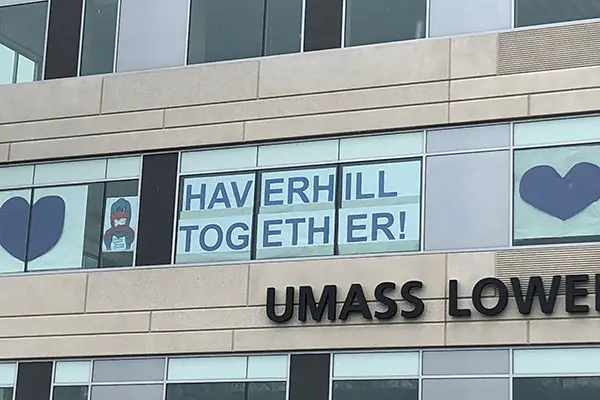
The windows of the Innovation Hub Haverhill display "Hearts for Haverhill" during the COVID-19 pandemic.
04/30/2020
By Stephanie Guyotte
For example, several iHub-based technology companies have started building new products and utilizing the iHub’s prototyping resources to make face shields for first responders. One resident education consultant is helping her clients, most of whom are parents of children with disabilities, navigate resources for students virtually. And an IT company has helped its customers transition employees to fully remote operations and created new virtual training programs.
Microshare, based at the Haverhill Innovation Hub, uses data science and Internet of Things technology to help commercial buildings and other properties be more efficient and reduce costs. The company started working with hospitals in 2019, deploying its sensor technology and feedback devices.
With the arrival of COVID-19, Microshare took a second look at its devices, recognizing that the public would be hesitant to use a physical button to provide feedback. Add to that, hospital staffs are stretched thin and there is strong need for continued sanitation, Microshare is now developing a new option.
“These factors led us to create a virtual device -- the touchless feedback app -- which uses a printed barcode on a cleanable placard instead of a physical device,” said Tim Panagos, Chief Technology Officer. “Users can scan the barcode with the camera on their smart phone, after which, users are presented with virtual buttons that send immediate feedback with the simple tap of a phone screen. Data can be mixed together from both the touchless app and the physical devices.”
Microshare is piloting these devices in healthcare and hospital settings and other types of venues that are working to ramp up their cleanliness and sanitation to slow the spread of COVID-19. The placards can be printed onsite by staff, the language and buttons can be easily customized, and notifications and data history can be seen immediately. The use-cases have jumped from restroom cleanliness to monitoring patient status in make-shift treatment centers with thousands of beds.
“As a start-up, really our key advantage is the ability to move quickly to address evolving market needs,” Panagos said. “We are accustomed to being agile and we are comfortable operating virtually. We find that we are uniquely suited to operate in this strange environment. On the other hand, access to capital has become a challenge as traditional investors retreat from alternative investments in the face of stock market losses.”
Uncommon Catalyst, which does IT management and strategic consulting for a wide range of clients, has helped its clients transition to remote work by accelerating their move to the cloud, deploying VPN tech and auditing computers for use outside the corporate network. It deployed a brand new learning management system for one client and has been helping them produce live and on-demand video content; allowing them to move their in-person training programs into the virtual space.
Uncommon Catalyst CEO Seth Cordes has also loaned out a small number of laptops to families in the Haverhill Public School system who were in need.
“The quarantine has put already vulnerable students and families in a very difficult position,” said Innovation Hub member Allison Brear-Farrell, whose company Insight Educational Consulting supports families of students with disabilities. “However, we have been able to problem solve collaboratively with school districts through virtual meetings and individual remote learning plans to meet the student's unique learning needs.”
The Greater Haverhill Chamber of Commerce, which operates out of the Innovation Hub Haverhill, has created two funds to support small businesses – a restaurant gift card matching program for local restaurants and similar matching fund for retailers and services including fitness studios and hair salons and other small businesses that remain closed.
Longtime iHub Lowell member John Noto is assisting in the production of face masks for responders through Lowell Makes, a Lowell makerspace. Noto, a cofounder of Lowell Makes, said the makerspace has 14 3D printers running constantly to print masks. With folks using their own equipment at home in addition to the makerspace, they have made more than 700 masks and 200 face shields.
“We’re a collection of 150 artisans,” Noto said of Lowell Makes. “Mostly everyone does their own thing but in this crisis to see everyone step up and come together has been an impressive thing to watch.”
